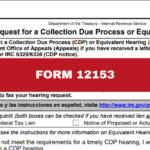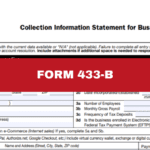When dealing with tax matters, it can often be beneficial to have a qualified representative act on your behalf. The IRS allows several types of professionals and individuals to serve as your representative under a Power of Attorney (POA).
This authorization is formalized through IRS Form 2848, Power of Attorney and Declaration of Representative. Here’s a quick guide to understanding who can be your representative before the IRS.
1. Attorneys
Attorneys are members in good standing of the bar of the highest court in their jurisdiction. There are many attorneys and firms (such as ours) that concentrate their practice on IRS tax problem resolution.
Why Choose Them:
Attorneys bring a wealth of legal knowledge and can offer comprehensive advice and representation, particularly in complex tax disputes or legal proceedings.
2. Certified Public Accountants (CPAs)
CPAs are professionals holding an active license to practice accounting in their respective jurisdictions.
Why Choose Them:
CPAs have extensive training in tax matters and financial regulations, making them well-suited for handling intricate tax issues, audits, and financial planning.
3. Enrolled Agents (EAs)
EAs are individuals who have passed a comprehensive IRS exam or have relevant experience as former IRS employees. They are authorized by the IRS under Circular 230.
Why Choose Them:
EAs specialize in taxation, possessing deep knowledge of tax laws and IRS procedures, making them highly effective representatives in tax disputes and compliance issues.
4. Officers of Taxpayer Organizations
These are bona fide officers of a taxpayer organization, such as corporate officers or other high-ranking officials within an entity.
Why Choose Them:
Officers are intimately familiar with the financial and operational aspects of the organization, providing valuable insight and representation in tax matters affecting the entity.
5. Full-Time Employees
Full-time employees of the taxpayer.
Why Choose Them:
Having a full-time employee as your representative can be advantageous as they understand the internal workings and financial status of the business, allowing for effective communication and representation before the IRS.
6. Family Members
Members of the taxpayer’s immediate family, including spouses, parents, children, grandparents, grandchildren, step-parents, step-children, brothers, and sisters.
Why Choose Them:
Family members can offer a level of trust and familiarity that is invaluable, particularly for individuals who may feel more comfortable with a family member handling their tax affairs.
7. Enrolled Actuaries
Enrolled actuaries are professionals who have been authorized by the Joint Board for the Enrollment of Actuaries under 29 U.S.C. 1242.
Why Choose Them:
Enrolled actuaries have specialized knowledge in pension and retirement plan matters, making them ideal for representing clients in issues related to retirement planning and compliance.
8. Unenrolled Return Preparers
These are tax preparers who are not enrolled agents, CPAs, or attorneys but meet specific criteria, including having prepared and signed the tax return in question, holding a valid Preparer Tax Identification Number (PTIN), and completing the Annual Filing Season Program.
Why Choose Them:
While their representation rights are limited, unenrolled return preparers can assist with issues directly related to the tax returns they have prepared, providing continuity and familiarity with the specific return.
9. Qualifying Students or Law Graduates
Law, business, or accounting students, or law graduates working in a Low Income Taxpayer Clinic (LITC) or Student Tax Clinic Program (STCP).
Why Choose Them:
These individuals receive special permission to represent taxpayers and can offer knowledgeable, pro bono assistance under the supervision of qualified professionals, making them a valuable resource for those unable to afford traditional representation.
10. Enrolled Retirement Plan Agents (ERPAs)
ERPAs are enrolled under the requirements of Circular 230 to represent clients in retirement plan matters.
Why Choose Them:
ERPAs are experts in retirement plan regulations and compliance, offering specialized representation in issues related to retirement plans.
Choosing the right person to represent you before the IRS is very important for managing your taxes and resolving any issues. Whether you choose an attorney, CPA, enrolled agent, or another authorized representative, make sure they have the right qualifications and experience for your specific tax needs. By picking the right representative, you can deal with the complexities of the tax system with more confidence and peace of mind.







 Steven N. Klitzner, P.A. is a tax attorney based in Miami, Florida. He has been practicing tax law for over 40 years, and currently holds a 10.0 rating by Avvo. Mr. Klitzner was appointed to the IRS Service Advisory Council in 2021 and is...
Steven N. Klitzner, P.A. is a tax attorney based in Miami, Florida. He has been practicing tax law for over 40 years, and currently holds a 10.0 rating by Avvo. Mr. Klitzner was appointed to the IRS Service Advisory Council in 2021 and is... 





